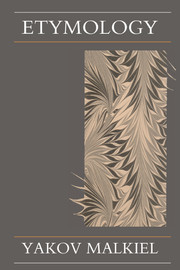Preface
Published online by Cambridge University Press: 05 June 2012
Summary
The choice of an accurate and, at the same time, appealing title for this book has, I confess, cost me considerable headaches. The point is that etymology (unless one is willing to equate it with some such indifferent rendering as ‘the discipline of word origins’), has tended to mean, in its actual applications and, above all, implications, entirely different things to successive generations of scholars and laymen alike, from Antiquity to the concluding years of the twentieth century.
In certain remote periods, the literal meaning of a given proper name and the messages encoded into it (especially but not exclusively in reference to proper names of persons) meant incomparably more to an average member of the speech community in question than the provenance of any common nouns. After all, parents in many places enjoy the privileges, within the framework of tradition, of selecting, for their newborn children, names not infrequently endowed with special messages or associations. Conversely, few individuals are invited, encouraged, or allowed to coin novel designations for, let us say, dishes or pieces of furniture. In the second half of the last century, which was marked by a new enthusiasm for science, accurate etymologizing mattered chiefly to those eager to reconstruct a plausible evolutionary chart of sounds and forms, viewed across the ages, since their development, as was then firmly believed, was governed by strict laws, best discoverable by those familiar at first hand with reliably established starting points for word trajectories.
- Type
- Chapter
- Information
- Etymology , pp. ix - xiiPublisher: Cambridge University PressPrint publication year: 1993
- 1
- Cited by

